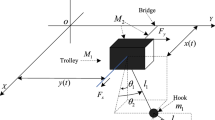Abstract
This paper describes stability assist wheel control based on RLS estimation with forgetting in order to improve the dynamic stability of a multi-axle all-terrain crane. Existing multi-axle all-terrain cranes have greater mass and a longer distance between axles than ordinary vehicles, so their rotational inertia is very large. Large rotational inertia implies a slower dynamic response for yaw motion, and it is difficult to achieve the desired yaw motion within an expected amount of time. Therefore, ensuring yaw and lateral dynamic stability is an important theme in research regarding multi-axle all-terrain cranes. In this study, to ensure the crane’s dynamic stability, a simplified linear crane model of a multi-axle all-terrain crane was developed, in which an assist wheel was chosen according to speed, for control. To improve the driving stability, the chosen assistant wheel’s optimal steering angle was calculated through LQR, and to calculate the optimal feedback gain and steering angle, the rotational inertia and lateral velocity were estimated using recursive least square algorithms with forgetting. MATLAB/Simulink based simulations were used to evaluate the performance of the assist wheel controller for improving the crane’s dynamic stability, and the simulation results showed that the proposed stability assist wheel control method improved yaw and lateral dynamic stability over existing steering systems.
Similar content being viewed by others
References
C. Cheng and D. Cebon, Improving roll stability of articulated heavy vehicles using active semi-trailer steering, Vehicle System Dynamics, Int. J. Vehicle Mech. Mobility, 46 (2008) 373–88.
G. Fei and L. Xue-yuan, Turning characteristic study of multi-axle compound steering vehicle, Transportation Electrification Asia-Pacific (ITEC Asia-Pacific), 2014 IEEE Conference and Expo (2014) 1–5.
D. Eisele and H. Peng, Vehicle dynamics control with rollover prevention for articulated heavy trucks, Proceedings of AVEC 2000, 5th Int. Symp. Adv. Vehicle Control (2000).
C. Vassal, O. Sename, L. Dugard and M. Savaresi, Vehicle dynamic stability improvements through gain-scheduled steering and braking control, Vehicle System Dynamics: Int. J. Vehicle Mech. Mobility, 49 (2011) 1597–1621.
H. Fathy, D. Kang and J. Stein, Online vehicle mass estimation using recursive least squares and supervisory data extraction, IEEE American Control Conference (2008) 1842–1848.
Y. Liu, L. Xie and F. Ding, An auxiliary model based on a recursive least squares parameter estimation algorithm for non-uniformly sampled multirate systems, Proceedings of the Institute of Mechanical Engineers, Part I: Journal of Systems and Control Engineering, 223 (2009) 445–454.
K. Oh and K. Yi, A predictive driver model with physical constraints for closed loop simulation of vehicle-driver system, IEEE Int. Conf. Intelligent Transportation Syst. (2014) 3126–3131.
A. Vahidi, A. Stefanopoulou and H. Peng, Recursive least squares with forgetting for online estimation of vehicle mass and road grade: Theory and experiments, Vehicle Syst. Dyn., 43 (2005) 31–55.
A. Zareian, S. Azadi and R. Kazemi, Estimation of road friction coefficient using extended Kalman filter, recursive least square, and neural network, Proc. IMechE Part K: J. Multibody Dyn. (2015) 1–17.
K. Oh, J. Seo, J. Kim and K. Yi, An investigation on steering optimization for minimum turning radius of multi-axle crane based on MPC algorithm, Proceedings of 15th International Conference on Control, Automation and Systems (2015) 1974–1977.
Z. Xiao and B. Xiao, Research on all-wheel steering control strategy for the three-wheel forklift, Journal of Mechanical Science and Technology, 30 (2016) 4717–4724.
F. Yakub, S. Lee and Y. Mori, Comparative study of MPC and LQC with disturbance rejection control for heavy vehicle rollover prevention in an inclement environment, Journal of Mechanical Science and Technology, 30 (2016) 3835–3845.
Author information
Authors and Affiliations
Corresponding author
Additional information
Recommended by Associate Editor Deok Jin Lee
Kwangseok Oh received his B.S. degree in mechanical engineering from Hanyang University in 2009 and M.S. degree in mechanical and aerospace engineering from Seoul National University, Korea in 2013. He is an Assistant Professor in the Department of Mechanical Engineering at Hankyong National University, Korea. His research interests include construction machinery, vehicle control, and driver modeling.
Jaho Seo received his B.S. degree in agricultural machinery and process engineering from Seoul National University, Seoul, Korea in 1999, his M.E. degree in mechanical engineering from the University of Quebec (Ecole de Technologie Superieure), Montreal, Canada in 2006, and Ph.D. in mechanical engineering from the University of Waterloo, Waterloo, Canada in 2011. He was with the Department of Mechanical and Mechatronics Engineering of the University of Waterloo as a postdoctoral fellow in 2011, the Department of System Reliability of the Korea Institute of Machinery & Materials (KIMM) as a Senior Researcher for 2012-2016, and the Department of Biosystems Machinery Engineering of Chungnam National University, Korea as an Assistant Professor for 2016-2017. Since 2017, he has been an Assistant Professor at the Department of Automotive, Mechanical and Manufacturing Engineering, University of Ontario Institute of Technology where he has been involved in research on the development of autonomous control systems for intelligent mobile machines.
Young-Jun Park has been working in the Department of Biosystems and Biomaterials Science and Engineering at Seoul National University since 2017 and worked in KIMM for the last 10 years. He is interested in the design and analysis of transmissions for agricultural machines and construction equipment. He received a B.S., M.S. and Ph.D. in Agricultural Machinery Engineering from Seoul National University, Korea.
Kyongsu Yi received the B.S. and M.S. degrees in mechanical engineering from Seoul National University, Korea, in 1985 and 1987, respectively, and the Ph.D. degree in mechanical engineering from the University of California, Berkeley, in 1992. Dr. Yi is a Professor at the School of Mechanical and Aerospace Engineering at Seoul National University, Korea. He currently serves as a member of the editorial boards of the KSME, IJAT and ICROS journals. Dr. Yi's research interests are control systems, driver assistant systems, and active safety systems of a ground vehicle.
Rights and permissions
About this article
Cite this article
Oh, K., Seo, J., Park, YJ. et al. Stability assist wheel control of multi-axle all-terrain crane using RLS algorithms with forgetting. J Mech Sci Technol 31, 4435–4446 (2017). https://doi.org/10.1007/s12206-017-0844-3
Received:
Revised:
Accepted:
Published:
Issue Date:
DOI: https://doi.org/10.1007/s12206-017-0844-3




